
ST. VINCENT PALLOTTI
COLLEGE ENGINEERING AND TECHNOLOGY, NAGPUR
An Autonomous Institute
Unnat Bharat Abhiyan
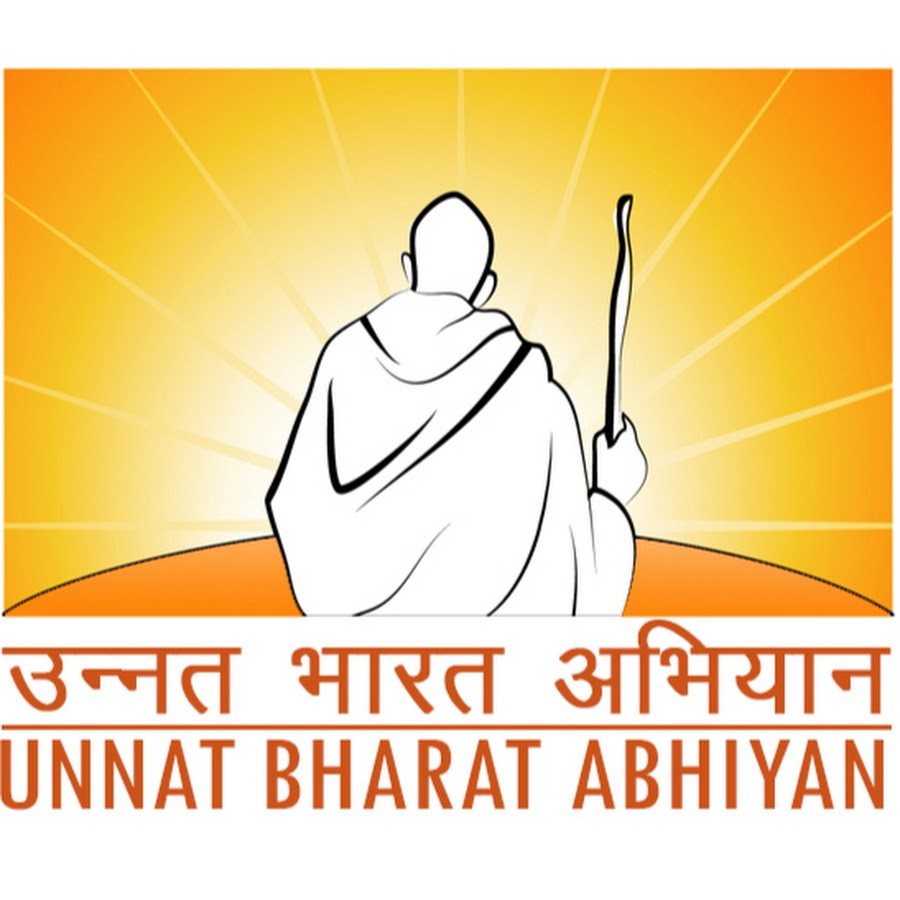

ST. VINCENT PALLOTTI
COLLEGE ENGINEERING AND TECHNOLOGY, NAGPUR
An Autonomous Institute
Unnat Bharat Abhiyan



UBA students have embarked on a transformative project aimed at revolutionizing transportation in rural India. Their endeavor, titled "Design and Development of Low-Cost Converted E-Bicycle for Panjari Lodhi Village," blends innovative engineering with sustainable development principles. The project focuses on Panjari Lodhi Village, a rural region facing transportation challenges. Recognizing the need for an affordable and eco-friendly mobility solution, the students developed a conversion system to transform conventional bicycles into hybrid electric bicycles. This approach not only revives discarded cycles but also provides a cost-effective alternative to traditional electric bicycles.
This ingenious approach contributes to sustainability, accessibility, and rural economic growth, fostering inclusive development in Panjari Lodhi Village.
Project Guide: Dr. Ashutosh Verulkar

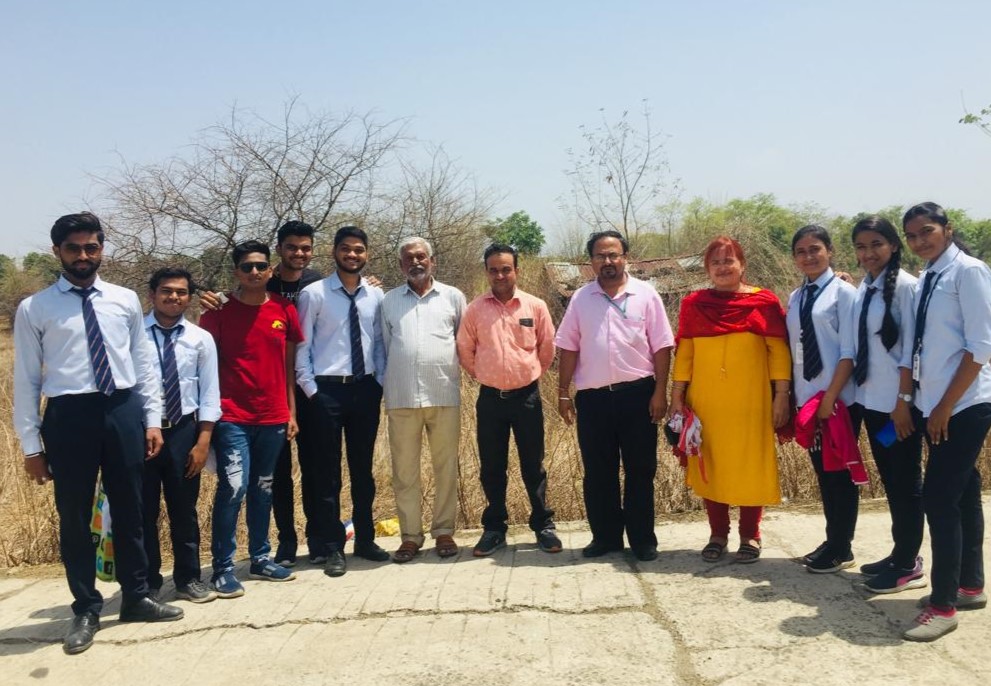
The Smart Solar Street Lamp Project is an innovative rural electrification solution, successfully installed in Khatmari village under the Unnat Bharat Abhiyan, a Government of India initiative for rural development. This project was led by 2021 pass-out alumni of the E&TC Department, Mr. Atharva Hampiholi and Mr. Ashutosh Maske, with support from second-year students of St. Vincent Pallotti College of Engineering and Technology, Nagpur. The smart solar lamp is designed with cutting-edge features, including an automatic solar panel cleaning system, automatic battery cutoff under low voltage, automatic night light activation, and an anti-theft alarm. These features ensure continuous operation, increased efficiency, and minimal maintenance, making it an ideal solution for rural electrification.
This project not only ensures sustainable and cost-effective lighting but also showcases the power of innovative technology in transforming rural infrastructure.
Project Guide: Dr. Ashutosh Verulkar
,Students Involved: Atharva Hampiholi and Ashutosh Maske(2021 passout students) who were assisted by Students Yogendra Topre, Mehandi Bhoyar, Prajwal Atkale, Prathamesh Lakhe, Rohit Thakre, Sahil Padole, Sakshi Bhoyar, Shruti Kayarkar, Shubhangi Kaikadi and Tajshree Zade( 2023 batch)

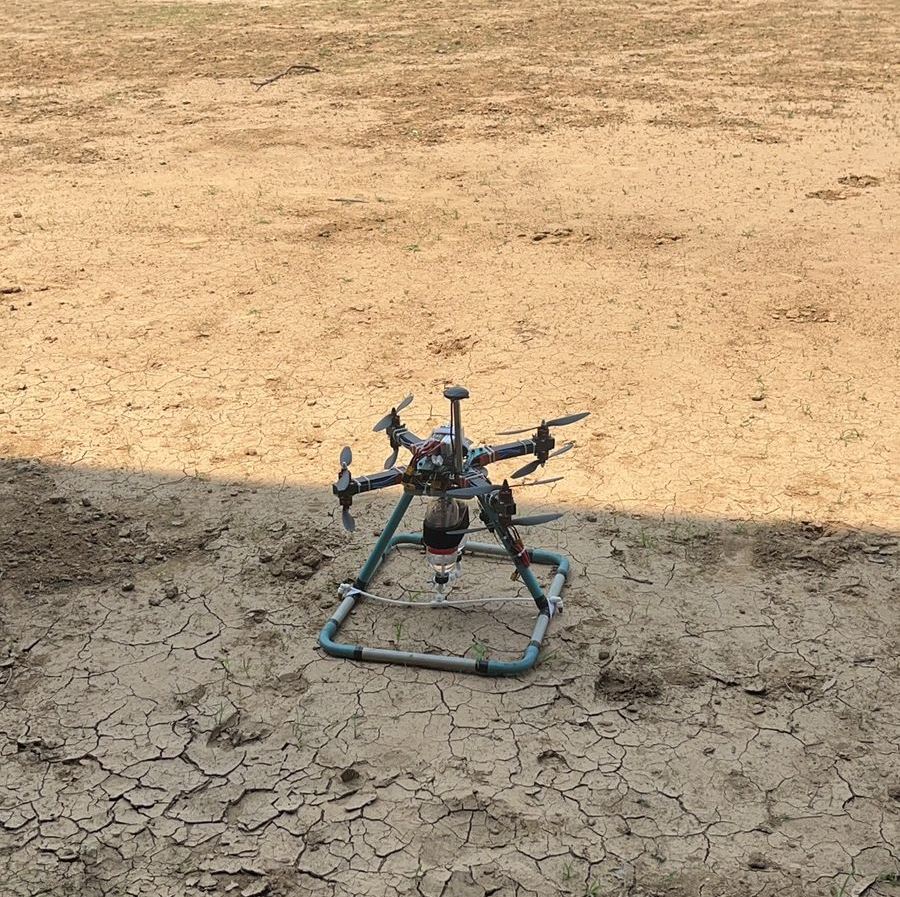
In response to the challenges faced by farmers in Vidarbha, such as unpredictable rainfall and water scarcity, this project introduces an innovative solution under Unnat Bharat Abhiyan 2.0. The team is designing and implementing an automated farming system for Khatmari Village, leveraging the power of drone technology and machine learning. This project aims to improve crop yields, reduce reliance on manual labor, and enhance the economic well-being of the farming community. By utilizing a DJI Pro drone equipped with a high-resolution camera, the system will collect data on soil moisture, crop health, and environmental conditions.
By integrating drone technology with AI-driven analytics, this project contributes to the sustainable development of the agricultural sector, ensuring higher productivity and reduced environmental impact.
Project Guide: Prof. Priti Golar
Student Involved: Dipmala Kathale,Saurav Nerkar,Rutuja Hande,Rohit Rangari,Rushabh Katekhaye,Manthan Raut,Simran Daultani,Vaishnavi Butle,Harshal Aglawe,Sarthak Khadse,Himanshu Lambat,Atharva Zade,Nishant Sheikh,Shruti Pimple,Tejaswini Nikhare

The Virtual Doctor App is a healthcare platform developed by Computer Engineering students. It aims to improve rural healthcare accessibility through technology. The app provides an integrated solution for online appointments, consultations, and pharmacy services, addressing the challenges rural communities face in accessing quality healthcare. It features three main modules:
The project is currently in progress, with ongoing efforts to enhance its functionality and expand its reach.
Project Guide: Dr. Pallavi Wankhede
Students Involved: Rajlin Kaur, Vedant Nisar, Sameer Bawane, Parth Upadhye.


The IoT-Based Seed Sowing Agro-Bot for Kharif Crop is an innovative agricultural solution designed to automate the seed-sowing process, improving precision, efficiency, and sustainability in farming. This fully autonomous bot integrates IoT, GPS, and real-time sensor data to optimize seed placement, reduce wastage, and ensure ideal crop spacing. The system uses soil moisture and pH sensors to provide valuable insights, helping farmers make informed irrigation and fertilization decisions.
This technology-driven approach empowers rural communities, fostering agricultural innovation while promoting sustainability and efficiency in farming.
Project Guide: Dr. Komal Gehani
Students Involved: Abhishek Wasekar, Nupendra Waghmare, Shashwati Urkude, Supriya Thantharate.
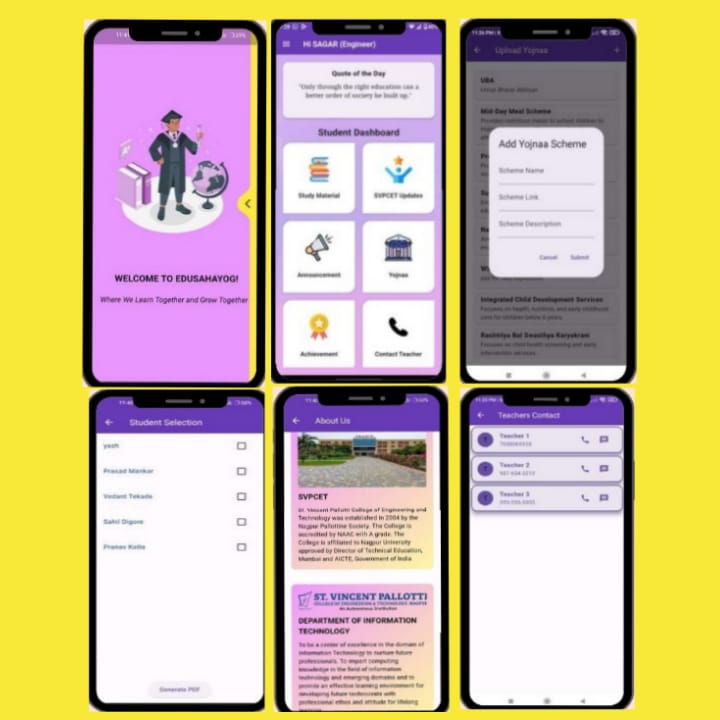
Edusahayog is a digital platform designed to enhance rural education, developed through extensive research in villages. It provides role-based access for students and teachers, motivational content, and personalized goal tracking. The platform tackles challenges like inefficient data management and limited resource access by offering features such as study material sharing, government scheme awareness (Yojnaas), attendance management, achievement tracking, SVPCET updates, and announcement systems. The name “Edusahayog” combines "Edu" (education) and "Sahayog" (support in Hindi), reflecting its mission to empower rural communities with essential educational tools.
Edusahayog is committed to continuous updates and enhancements. Future upgrades include homework submission, quizzes, AI assistant integration, and multilingual support. The app will extend its reach to more villages, broadening its impact.
Project Guide: Dr. Priti Golhar
Students Involved: Mohit Bandawar, Nakul Wanjari, Kushal Khadgi, Ishan Sathawane, Archit Kanadkhedkar, Prasad Mankar.

The Solar Powered Electric Tricycle is an innovative mobility solution designed to enhance independence and accessibility for persons with disabilities. It is equipped with a solar panel integrated into the roof, harnessing renewable energy while providing shade for the rider. The electric motor and battery system ensure efficient and reliable operation, reducing dependency on conventional fuel sources. The design is adjustable and convertible, catering to users with varying mobility needs while offering protection from different weather conditions. This project promotes mobility, sustainability, and employment opportunities for persons with disabilities in maintenance and production.
By combining sustainability and accessibility, this project contributes to a more inclusive and environmentally conscious society.
Project Guide: Dr. Ashutosh Werulkar
Students Involved: Himanshu Lambat, Bharat Raut, Nishaath Sheikh, Amish Raut, Kunal Tekade, Devansh Chheniya.

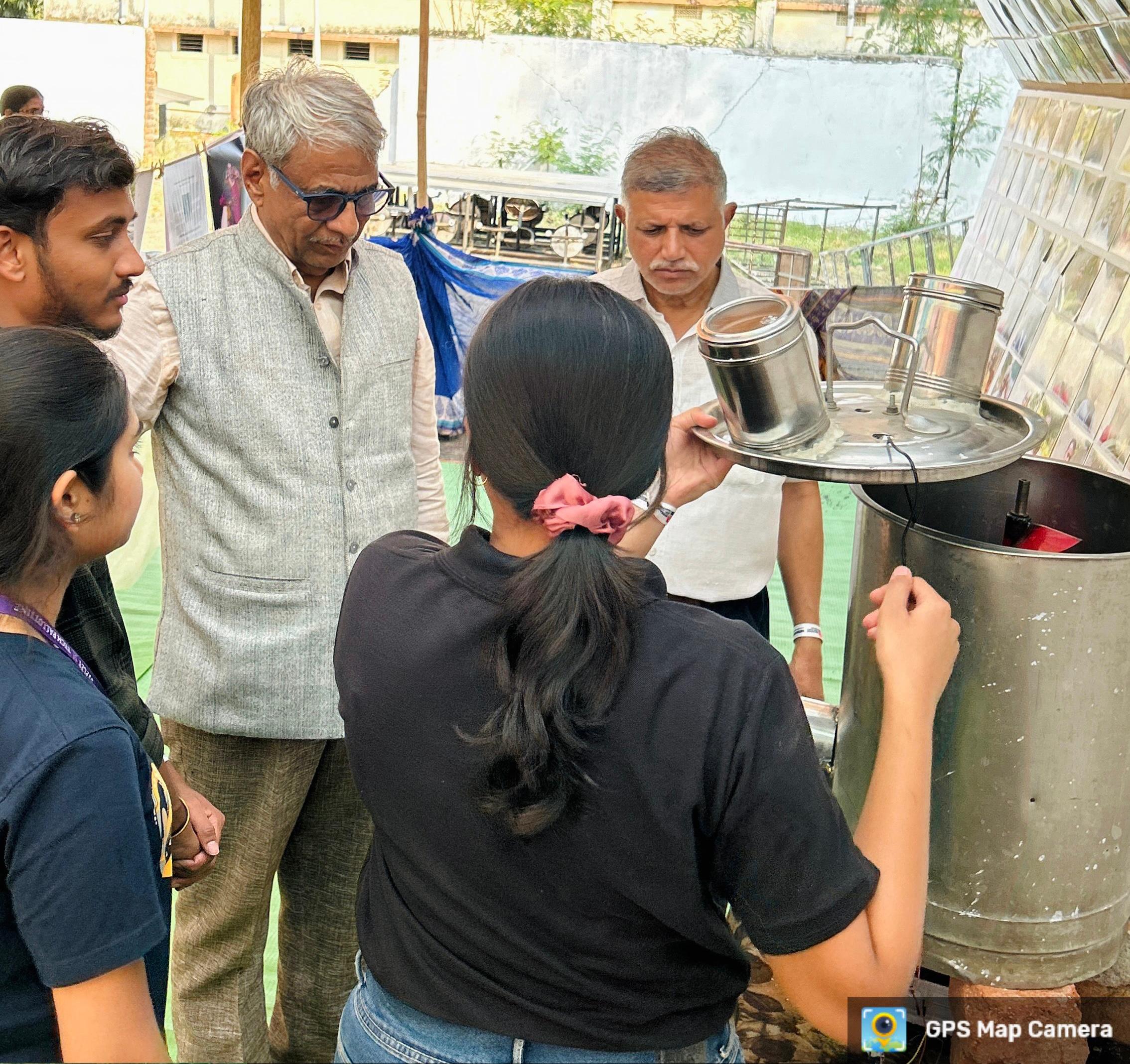
Food waste is a major global issue, contributing to environmental degradation. Traditional composting methods can be slow and inefficient. To tackle this problem, a solar-powered smart composter is being developed to automate the composting process, improving efficiency and sustainability. This system integrates IoT sensors to monitor temperature, pH, and moisture in real time, ensuring optimal composting conditions. Powered by solar energy, it is energy-efficient and sustainable, making it suitable for households, farms, and urban waste management.
This project promotes renewable energy use and contributes to a sustainable waste management system, offering a scalable, cost-effective solution for composting needs.
Project Guide: Dr. Ashutosh Verulkar
Students Involved: Onkar More, Gunjan Dhore, Vaishnavi Bodhalkar, Aryan Gaurkar.

The Anandwan Digital Mapping & Architectural Visualization project is an initiative marking the 75th anniversary of Anandwan village, Warora. This project focuses on creating highly accurate 3D architectural models and layered maps to support comprehensive spatial analysis and urban planning. By conducting detailed surveys and historical mapping, the project will illustrate the village’s architectural transformation from 1949 to the present, offering deep insights into housing settlements, building typology, infrastructure growth, and material technologies.
This initiative aims to assist stakeholders—including architects, engineers, local authorities, and planners—in sustainable development and historical preservation efforts. The project will also serve as an educational resource, inspiring students and researchers interested in urban planning, digital mapping, and rural development.
Project Guide: Dr. Suyog Dhote

This project automates attendance tracking for daily wage workers in factories, workshops, and farms using an RFID-based system. Workers scan their RFID cards at entry and exit points, and their attendance and work hours are recorded directly into Google Sheets for seamless tracking. The system also generates monthly reports and analytics, simplifying wage calculations and reducing errors. Designed for scalability and cost-effectiveness, the project aims to enhance workforce management across various industries.
This project optimizes workforce management, ensuring accurate record-keeping, reduced errors, and enhanced security for industries requiring efficient attendance solutions.
Project guide: Sayali Kanhav Maam
Students Involved: Rochan Awasthi,Sayali Bambal